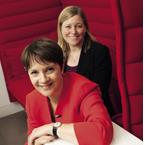This has posed a significant challenge for the strategic outsourcing organisation which, historically, has grown through a cluster of smaller businesses that have been allowed a degree of autonomy, including in the benefits offered to employees.
Katherine Thomas, group HR director, says: “When you start to bring that all together to deliver an integrated model, you could potentially have quite a disjointed benefits offer for people who are working side by side. So one of the challenges that shape what we do around benefits is about how we deliver a more aligned offer.”
The vast majority of Mitie’s 74,500 employees work on contracts for the group’s clients, which include a range of private and public sector employers. A sizeable number of staff are on Transfer of Undertakings (Protection of Employment) (Tupe) contracts, which means they have benefits carried over from previous roles.
Margot Burleton, head of reward at Mitie Group, says: “There are maybe only around 14,000 employees that we consider our salaried population, and those are the people whose packages we can really alter.”
Thomas adds: “We have a very diverse employee population, with quite a diverse set of needs and aspirations. That means we need a broad benefits offer to be able to respond to the sort of needs that population has.
“We are a service business, so the only asset we have is our people, and our values are around people, passion, fresh thinking and exciting futures. That shapes the proposition we make to our employees, in terms of the careers they can have with us and the rewards they can expect to receive.”
Employee share schemes

Mitie’s name is actually an acronym for Management Incentive Through Investment Equity. This highlights the organisation’s focus on ensuring its employees are involved in the business, and is the model for one of several share schemes it offers to staff.
The model, which has been in place throughout Mitie’s 26-year history, is similar to a private equity scheme. The organisation invests 51% into a new or recapitalised business, while the management team invests 49%.
Burleton says: “Over five to seven years, we start hitting profit targets that were set along the way. Should we achieve that, Mitie Group will value the business and pay out in shares to the management team. It essentially buys the business from the management team. This business then gets rolled into Mitie Group.”
Mitie Group also offers other share plans for a wider range of employees, all administered by Capita Employee Benefits. About 90 senior managers are offered a long-term incentive plan, and 500 others can take part in an executive share option plan.
Some 3,000 employees took part in Mitie’s latest three-year sharesave scheme, while a share incentive plan (Sip), introduced in 2012, has 2,000 participants. “Different employee groups are attracted to different schemes,” says Burleton. “Sharesave is pretty secure, and that’s where you’ll find the majority of our more junior employees. The Sip is a bit more risky.”
The numbers of employees taking part in Mitie Group’s share schemes has doubled over the past two years, and Thomas credits Burleton for creating clear, straightforward communications to promote the schemes.
“We’ve found that some of the language used around share plans can be very convoluted and hard to understand,” she says. “Margot has produced some really good collateral that is available through all our channels, to help people to understand.
“One of the challenges with bringing in a Sip is that you have to be quite careful with how you explain to people how it differs from sharesave. That really forced us to put together some clear, straightforward communications to help people understand what they can sign up for and what the outcomes could be.”

Multi-employee recognition
Mitie has also aligned its share schemes to its recognition programme, Mitie Stars, which operates on four levels. The first is a multi-employee monthly recognition which awards a certificate and a badge, and the second is a monthly £500 award for an employee in each of the group’s five divisions.
The third level is an annual prize of £2,500 for one employee in each division, and the fourth is an annual prize of £15,000 for one employee across the entire organisation.
Peer-to-peer nominations are approved by line managers. Each subsequent award is then chosen from the previous shortlist by management.
Burleton says: “We have said that employees, should they wish, can exchange some or all of [an award] for restricted shares, which they would have to hold for one year. We don’t just hand over £15,000 cash. They decide what their prize is.”
Auto-enrolment staging
With its share plans well established, Mitie Group has turned its attention to its pension schemes. It has had three auto-enrolment staging dates in 2013: 1 April, 1 August and 1 September, and has postponed auto-enrolment for each for three months. “We have multiple payrolls, so we have multiple staging dates based on the size of the organisation,” says Burleton.
Before auto-enrolment, only about 2,000 Mitie employees belonged to a pension scheme. About 500 belong to a defined benefit (DB) plan that has been closed to new entrants since 2006. The group’s stakeholder defined contribution (DC) scheme is being phased out during auto-enrolment, with members moved to a new group personal pension (GPP) plan provided by Scottish Widows which was introduced on 1 April to coincide with the first staging date.
“Auto-enrolment has been very interesting in that we decided not to go with our current DC provider, particularly because I don’t think it was really interested in going down the auto-enrolment route,” says Burleton. “Over time, everyone will be migrating to the Scottish Widows GPP.
“Employees who are being offered the DC pension know they have a defined period of time in which they have to make a decision. We find that, if we don’t give them a deadline, most people will just float away and not really think about it. If they don’t make that decision by the deadline, they will go into the auto-enrolment scheme.”
Mitie Group’s auto-enrolment scheme is a master trust, The People’s Pension, provided by B&CE. “We felt it was best able to meet the needs of the huge number of employees who were going to be auto-enrolled,” adds Burleton. “We have a lot of hourly employees, which B&CE has a lot of experience with.”
Other benefits changes at Mitie over the past year include the introduction of an employee assistance programme from Right Management and a re-brand of its voluntary benefits scheme, MiDeals, provided by Reward Gateway, formerly Asperity Employee Benefits.
Communication challenges

Mitie Group faces significant challenges in communicating its benefits because only about 9,000 employees are contactable by email. “For a certain percentage, our security business for example, there is an online scheduling tool that we can use to communicate,” says Burleton. “Any time a guard comes on to check his or her schedule, there is the opportunity to communicate with them about their reward.”
The organisation also communicates to staff through posters in its offices, articles on its intranet, which was launched in July 2013, and through traditional methods, such as payslips.
All these communication methods ensure Mitie Group’s employees are kept well informed about their benefits, and the organisation receives positive feedback, particularly from its annual employee engagement survey. Thomas says: “We keep the survey very short. We have 25 core questions, and then the businesses add to those questions with any specific areas they want to explore. We ask about the reward package, which people feel is competitive.
“What is interesting is that, if you ask people about benefits, you’ll never get the same answer. One person will be very excited by MiDeals, others will be excited about their share plans and others will be excited by private medical insurance.”
These variations reflect the different businesses and employees that make up Mitie Group. Thomas adds: “We have [reward] offerings that have been tailored historically around those very different needs and preferences, which helps us in terms of the broader offering, but it is also one of our challenges as we integrate.”
Mitie Group at a glance
Mitie Group is a strategic outsourcing organisation that provides facilities, property and energy management to a wide range of public and private sector businesses. Over the past five years, it has been moving towards an integrated facilities management model.
The FTSE 250 organisation, which was established almost 27 years ago, is headquartered in Bristol. It has 74,500 employees, with a gender split of 48% female and 52% male.
Mitie Group’s biggest challenge going forward is to continue to deliver growth and, in particular, maintain its margins in what continues to be a challenging external environment.
It reported total revenue of £1.98 billion in its Annual report 2013, which was published in June. This was up from £1.83 billion in 2012.
Career history

Katherine Thomas is group HR director at Mitie Group. Before joining the organisation in October 2010, she was responsible for talent, recruitment and leadership development at BT.
Before she joined BT, the telecoms giant had received employee engagement scores of 38%. Thomas says: “In other words, 62% of the talent population didn’t feel that staying at BT was in their best career interest. But by the time I left, that was up to 92%.”
Thomas’s experience in the outsourcing sector includes a spell as managing director of Serco’s Best Practice Centre. She also spent 11 years at consultancies Deloitte and Hay Group.
At Mitie Group, Thomas says she is most proud of “bringing together a capable, if not somewhat disjointed HR function to shape and deliver, over a period of three years, an integrated people strategy to support our growth strategy”.
Margot Burleton has been head of reward at Mitie Group for more than two years. She was previously group reward manager at BG Group for six years and spent 11 years as a consultant at Towers Perrin (now Towers Watson).
Burleton cites some of the larger projects she worked on during her years as a consultant as some of the most challenging. This included developing reward strategies for multinational organisations, as well as mergers and acquisitions work.
“That was around helping to harmonise pay and benefits across different businesses and countries,” she says.
Case study

David Melnick is learning and development co-ordinator for Mitie Group’s client services business. He has been with the organisation for two years.
“I provide the bulk of administrative services for the client services training team, while also delivering core service and development courses to our nationwide team,” he says.
Melnick makes good use of Mitie’s voluntary benefits scheme, MiDeals. He has been nominated in the organisation’s recognition plan, Mitie Stars, and has taken part in, and won, its annual all-employee talent competition, Mitie’s Got Talent.
“I think it’s great that Mitie recognises and rewards people for the hard work they put in every day,” he says. “My favourite was certainly participating in and winning Mitie’s Got Talent in 2012.
“Not only was it exciting and a fun way to incorporate one of my hobbies into my work, but with the £500 prize money I won, I was finally able to purchase a top-quality piano keyboard with several great accessories.
“I hadn’t had regular access to a piano since I was at university, so thanks to Mitie’s Got Talent, I have been able to rediscover my love for playing music with friends.”
The benefits
Pension
- Three auto-enrolment staging dates, 1 April, 1 August and 1 September. Auto-enrolment for each was postponed by three months.
- A stakeholder defined contribution (DC) plan being phased out during auto-enrolment
- A group personal pension (GPP) plan. Both schemes have a 5:5 matched employer contribution percentage for below manager level and a 5:8 matched employer contribution for management level.
- A master trust for auto-enrolment.
- A defined benefit (DB) pension scheme, closed to new entrants since 2006.
Share schemes
- The Mitie model: Management Incentive Through Investment Equity.
- A three-year sharesave scheme.
- A share incentive plan. Mitie Group matches one share to every 10 shares purchased.
- Executive share option scheme for about 500 managers.
Bonuses
- Performance-related bonuses for managers and above.
- Long-term incentive plan for about 90 senior managers.
Health and wellbeing
- Private medical insurance (PMI) through a healthcare trust for managers and above.
- A health cash plan, available as a voluntary benefit.
- An employee assistance programme (EAP).
Group risk
- Members of the DB pension scheme have access to group income protection.
- Group income protection, critical illness and personal accident cover are available for all employees on Tupe contracts.
- About 12,000 employees are covered by life assurance, provided by Canada Life.
Holidays
- Average is 25 days, but it varies by business.
- Some businesses provide a free holiday on an employee’s birthday or a Christmas shopping day.
Other benefits
- Employee discounts scheme.
- Job-need company car scheme, as well as a car allowance for about 650 employees.
- Recognition programme.
- Flexible working arrangements.
- Childcare vouchers.
- Bikes-for-work scheme.











